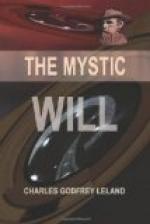“The theory of signatures,” says VAUGHAN, in his Hours with the Mystics, “proceeded on the supposition that every creatures bears in some part of its structure . . . the indication of the character or virtue inherent in it—the representation, in fact, of its ideal or soul. . . . The student of sympathies thus essayed to read the character of plants by signs in their organization, as the professor of palmistry announced that of men by lines in the hand.” Thus, to a degree which is very little understood, PARACELSUS took a great step towards modern science. He disclaimed Magic and Sorcery, with ceremonies, and endeavored to base all cure on human will. The name of PARACELSUS is now synonymous with Rosicrucianism, Alchemy, Elementary Spirits and Theurgy, when, in fact, he was in his time a bold reformer, who cast aside an immense amount of old superstition, and advanced into what his age regarded as terribly free thought. He was compared to LUTHER, and the doing so greatly pleased him; he dwells on it at length in one of his works.
What PARACELSUS really believed in at heart was nothing more or less than an unfathomable Nature, a Natura naturans of infinite resource, connected with which, as a microcosm, is man, who has also within him infinite powers, which he can learn to master by cultivating the will, which must be begun at least by the aid of sleep, or letting the resolve ripen, as it were, in the mind, apart from Consciousness.
I had written every line of my work on the same subject and principles long before I was aware that I had unconsciously followed exactly in the footprints of the great Master; for though I had made many other discoveries in his books, I knew nothing of this.
CHAPTER XII.
LAST WORDS.
“By carrying calves
Milo, ’tis said, grew strong,
Until with ease he bore a
bull along.”
It is, I believe, unquestionable that, if he ever lived, a man who had attained to absolute control over his own mind, must have been the most enviable of mortals. MONTAIGNE illustrates such an ideal being by a quotation from VIRGIL:
“Velut rupes vastum
quae prodit in aequor
Obvia ventorum furiis, exposta
que ponto,
Vim
cunctum atque minas perfert caelique marisque
Ipsa immota manens.”
“He as a rock among
vast billows stood,
Scorning loud winds and the
wild raging flood,
And
firm remaining, all the force defies,
From the grim threatening
seas and thundering skies.”
And MONTAIGNE also doubted whether such self-control was possible. He remarks of it:
“Let us never attempt these Examples; we shall never come up to them. This is too much and too rude for our common souls to undergo. CATO indeed gave up the noblest Life that ever was upon this account, but it is for us meaner spirited men to fly from the storm as far as we can.”




